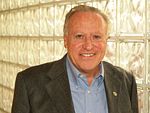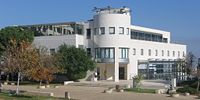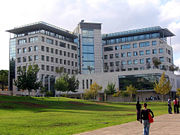Technion – Israel Institute of Technology
| Technion – Israel Institute of Technology | |
|---|---|
| הטכניון – מכון טכנולוגי לישראל | |
|
|
|
| Established: | 1924 |
| Type: | Public |
| President: | Yitzhak Apeloig |
| Vice-Presidents: | Paul Feigin, Moshe Sidi, Moshe Eizenberg, Zvi Kochavi, Peretz Lavie |
| Students: | ∼12,500 |
| Location: | Haifa, Israel |
| Campus: | Urban |
| Website: | www.technion.ac.il |
The Technion – Israel Institute of Technology (Hebrew: הטכניון – מכון טכנולוגי לישראל) is an internationally-acclaimed institute of technology in Haifa, Israel. The Technion, originally called the Technicum, was founded in 1912.[1] The emphasis was on natural sciences, engineering and architecture, with a school of medicine added later. Two Nobel laureates teach there.[2][3]
The Technion's Faculty of Electrical Engineering has been ranked among the top fifteen electrical engineering departments in the world.[4] Its engineering/technology and computer sciences faculties have been ranked among the top forty in the world.[5]
Contents |
History

The Technion was conceived in the early 1900s by the German-Jewish fund Ezrah, as a school of engineering and sciences, and the only higher learning institution, in then Ottoman Palestine — other than the Bezalel Academy of Art and Design in Jerusalem (founded 1907). The cornerstone was laid in 1912, but studies began only 12 years later, following an intense debate over the language of instruction. Ezrah deemed the then-developing Modern Hebrew inappropriate for scientific instruction, and demanded that German be used instead. However, in the aftermath of World War I and the decline of Germany's influence as a European superpower, Hebrew was adopted.
The Technion opened in 1924, although the official opening ceremony took place in 1925.
The first class amounted to 16 students, majoring in civil engineering and architecture.
During the 1930s, the Technion absorbed many Jewish scientists fleeing Nazi Germany and its neighboring countries.
The Technion awarded its first PhD in 1953 in electrical engineering. Until the opening of the school of engineering in the Ben Gurion University in the early 1970s, the Technion was the only institution in the country offering engineering degrees.
Academics
Faculty of Medicine

The Bruce and Ruth Rappaport Faculty of Medicine is one of three state sponsored medical schools in Israel. It was founded in 1969 and is active in basic science research and preclinical medical training in anatomy, biochemistry, biophysics, immunology, microbiology, physiology, pharmacology. Other facilities on the Faculty of Medicine campus include teaching laboratories, a medical library, lecture halls and seminar rooms. Academic programs are offered at the Rappaport Faculty of Medicine leading to the Master of Science (M.S.), Doctor of Philosophy (Ph.D.), and Doctor of Medicine (M.D.) degrees.
They have developed collaborative research and medical education programs with the world's leading institutions in medicine and bio-medical engineering including Harvard University, Johns Hopkins University and Mayo Medical School. Similarly, the Technion American Medical Students (TEAMS) program [6] at the Rappaport Faculty of Medicine offers an American-styled, four-year, graduate medical training program geared towared American & Canadian students that wish to take advantage of the academic resources of the Technion, but plan to return to North America to practice medicine. The instruction and testing of TEAMS program is entirely in English.
Faculty of Industrial Engineering and Management
The Faculty of Industrial Engineering & Management at the Technion is the oldest such department in Israel. IE&M (Industrial Engineering & Management) was launched as a Technion academic Department in 1958. The Department grew under the visionary leadership of the late Professor Pinchas Naor, who served as its founding Dean. Naor's vision was to combine IE with management by creating a large, inherently multi-disciplinary unit covering a wide spectrum of activities, from applied engineering to mathematical modeling; from economics and behavioral sciences to operations research and statistics.
The Behavioral Sciences area of the Technion [1]}} is the leader in applied social sciences research in Israel. It includes a program in Applied Psyshcology and in Human Relations Management. Faculty members include Anat Rafaeli[2]}}, Miriam Erez[3]}}, Ido Erev[4]}}, Peter Bamberger[5]}}, Danny Gopher[6]}}, and Eldad Yechiam[7]}}. The area has MA and PhD graduate programs.
Academic achievements
A group of Technion graduates created PHP (versions 3 through 5), a web programming language that is installed on more than 80% of the web servers worldwide.
A program devised by Evgeniy Gabrilovich and Shaul Markovitch of the Technion Faculty of Computer Science helps computers map single words and larger fragments of text to a database of concepts built from the online encyclopedia Wikipedia; this then helps in making broad-based connections between topics, to aid in filtering e-mail spam, performing searches and conducting electronic intelligence gathering at a more sophisticated level, according to the researchers.
Youth programs
The Technion offers many after-school and summer enrichment courses for young people on subjects ranging from introductory electronics and computer programming to aerospace, architecture, biology, chemistry and physics.
Programs of study

The Technion offers undergraduate and graduate studies in:
- Electrical engineering
- Civil and environmental engineering
- Mechanical engineering
- Biomedical engineering
- Chemical engineering
- Food engineering and biotechnology
- Agricultural engineering
- Aerospace engineering
- Industrial engineering and management
- Computer science
- Mathematics
- Physics
- Chemistry
- Biology
- Architecture and urban planning
- Science education and technology education
- Medicine
- Materials science
Notable faculty



- Yaakov Dori-President
- Abraham Lempel and Yaacov Ziv, developers of the Lempel-Ziv (LZW) compression algorithm.
- Avram Hershko and Aaron Ciechanover, recipients of the 2004 Nobel Prize in chemistry for the discovery of ubiquitin-mediated protein degradation
- Marcelle Machluf, biotechnology and food engineering
- Nathan Rosen, (co-author with Albert Einstein and Boris Podolsky of physics paper about the EPR paradox in quantum mechanics)
- Dan Shechtman, first observer of quasicrystals
- Asher Peres, co-discoverer of quantum teleportation, awarded the 2004 Rothschild Prize in Physics
- Jacob Bear, mathematical hydrogeology
- Eli Biham, cryptanalyst and cryptographer
- Liviu Librescu, hero of the Virginia Tech massacre
Notable graduates
- Shai Agassi — IT entrepreneur, Former Executive Board member of SAP AG
- Saul Amarel (1928-2002), pioneer in Artificial intelligence.[7]
- Itzhak Bentov — inventor and author
- Andrei Broder — captcha developer, Vice President of Yahoo, formerly vice president of AltaVista
- Yaron Brook — president and executive director of the Ayn Rand Institute
- Uzia Galil — founder of Israeli science-based industries
- Andi Gutmans — developer of PHP and co-founder of Zend Technologies
- Uzi Landau — politician
- Daniel M. Lewin — co-founder and CTO of Akamai, holder of two Technion degrees, killed while resisting AA Flight 11 hijackers 9-11 Commission Report
- Udi Manber — search engine developer and vice-president of Google, formerly vice-president of Amazon.com
- Dov Moran — founder of M-Systems and InFone
- Yuval Neeman — physicist, discovered quark model
- Avraham Shochat — politician
- Zeev Suraski — developer of PHP and co-founder of Zend Technologies
- Yossi Vardi — civil servant, entrepreneur
- Joseph Wang - electrochemist
- Avraham Yaski — architect, winner of 1982 Israel Prize for Architecture
- Zvi Zilker - mayor of Ashdod
- Zohar Zisapel — founder of RAD corporations
References
- ↑ http://www.haaretz.com/hasen/spages/1012505.html
- ↑ Prof. Aaron Ciechanover's Home Page
- ↑ Prof. Avram Hershko's Home Page
- ↑ Electrical Engineering Department, Technion - Israel institutes of Technology
- ↑ field
- ↑ http://teams.technion.ac.il
- ↑ Nagourney, Saul. "Saul Amarel, 74, an Innovator In the Artificial Intelligence Field", The New York Times, December 21, 2002. Accessed November 24, 2007.
See also
External links
|
|||||